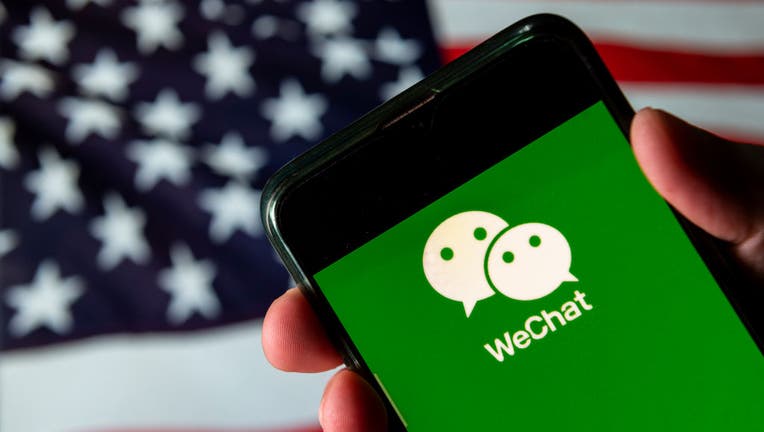Court prevents Trump administration from blocking WeChat app pending hearing

FILE - In this photo illustration the Chinese multi-purpose messaging social media and mobile payment app developed by Tencent, WeChat logo is seen on an Android mobile device with United States of America flag in the background. (Budrul Chukrut/SOPA Images/LightRocket via Getty Images)
SAN FRANCISCO - Late Saturday night, a federal judge in San Francisco issued a preliminary injunction blocking President Donald Trump's executive order limiting the WeChat messaging app in the United States.
The order had been scheduled to take effect at 11:59 p.m. Sunday.
Magistrate Judge Laurel Beeler ruled, based on the evidence presented in part at a Saturday hearing, that the order was a burden on protected speech of WeChat users in the United States.
She found that although the government had identified significant national security interests for its action, the order was not "narrowly tailored" to protecting those interests.
The preliminary injunction will preserve the status quo pending trial on the merits of the plaintiffs' claims.
WeChat began in China as a messaging app and over the years added additional functionality, including calling, video conferencing, and in-app payments. Because of the many functions integrated within the app, plaintiffs described it as a "super-app".
WeChat is estimated to have more than a billion users worldwide, including 19 million in the United States, according to the plaintiffs' complaint.
The government contended that the app is used by the Chinese government for surveillance and data collection within the United States and that the order was a justified exercise of the president's national security powers against a "foreign adversary whose hostile acts are undisputed, and whose aspirations for global dominance are undisputed."
The order, as subsequently interpreted by the U.S. Department of Commerce, imposed a number of limitations and prohibitions on WeChat and third parties, including prohibiting new downloads of the WeChat app, stopping the transfer of funds out of the United States, and forbidding the providing of technical services to WeChat by third parties.
The commerce department's interpretation limited the order to business-to-business transactions, not to "WeChat users who use the app for personal communications."
The plaintiffs contended that by prohibiting third-party services such as web hosting and internet transit services, WeChat would be effectively shut down, depriving millions of Chinese-speaking Americans of the primary platform they can use to communicate and interact with friends and family in China.
The government disputed that the order amounted to a shutdown, but conceded that the order would likely, over time, to lead to a "deterioration of functionality."
The judge found that as a result of the order "the app, while perhaps technically available to existing U.S. users, likely will be useless to them." Beeler determined that a preliminary injunction was needed to protect plaintiffs from "irreparable harm."

